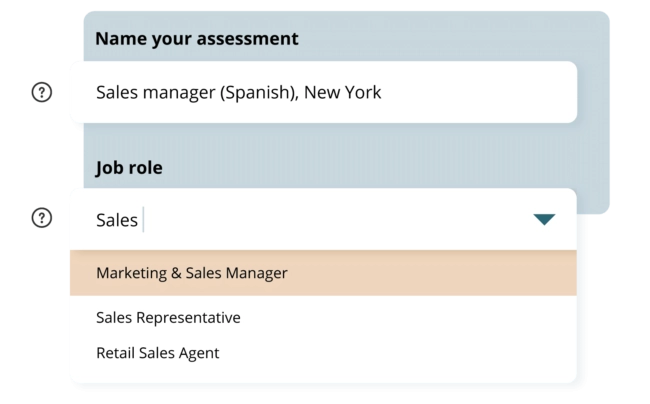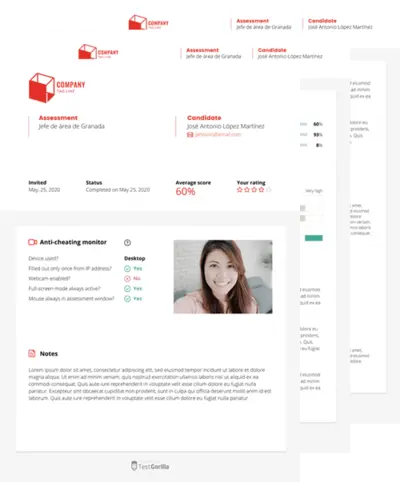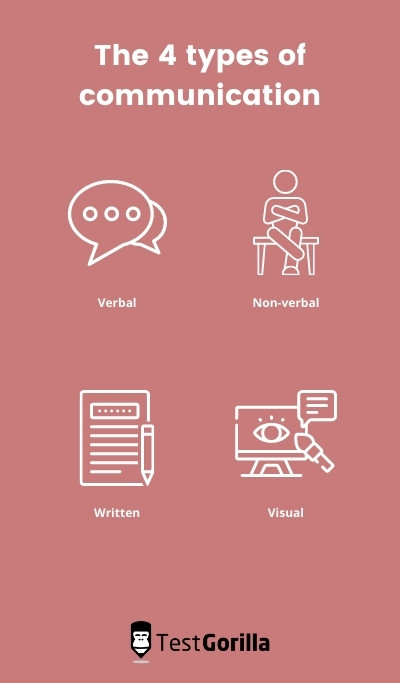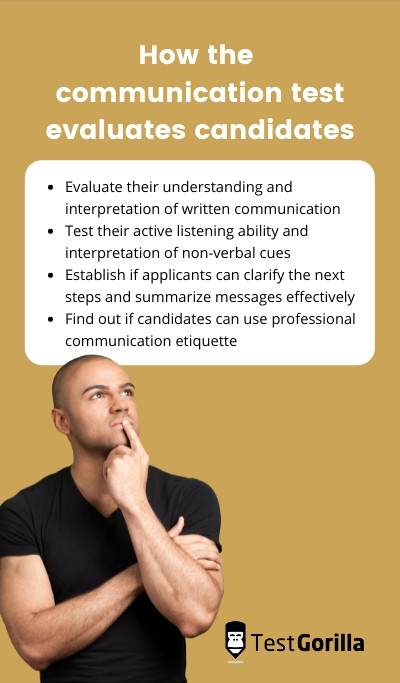Communication skills test: Pre-employment screening assessment to hire the best candidates
Summary of the Communication test
This online communication skills test assesses your candidates’ skills in communicating clearly and effectively using professional etiquette. This English communication skills test assesses candidates in both written and verbal communication, as well as non-verbal cues and active listening.
This pre-employment communication skills assessment is designed by a subject matter expert to screen candidates who have excellent workplace communication skills. You can send this online communication skills test to your prospective job applicants before inviting them to an interview. With data-driven results, now you can hire quality communicators, sales executives, etc., for all your customer-facing roles.
Covered skills
Understanding and interpreting written communication
Listening actively and interpreting non-verbal cues
Clarifying next steps and summarizing messages effectively
Using professional communication etiquette
Use the Communication test to hire
Any role that requires good communication skills to facilitate effective collaboration with others.
You can use this test for free when you sign up for a free plan.
Type
Time
Languages
Level
About the Communication test
Good communication is the foundation of good relationships. And good relationships are key to building A-teams that will take your organization from good to great. Good communication among the members of a team builds trust, resolves (and even prevents) problems, provides clarity and direction, improves productivity, and increases engagement.
This communication test evaluates candidates' skills in understanding, using, and interpreting written communication and assesses their verbal communication skills (both in an in-person and virtual environment) along with active listening and the interpretation of non-verbal cues. The communication test also evaluates candidates' ability to clarify next steps, summarize messages effectively, and use professional communication etiquette.
Candidates who perform well on this screening test can listen attentively to others, communicate with confidence and open-mindedness, and can offer both empathy and feedback in the appropriate scenarios and in the appropriate manner.
The test is made by a subject-matter expert
Sarah E.
Storyteller, communication coach, author and professional musician, Sarah offers workshops and coaching packages that reduce miscommunication – the most common cause of tension in the workplace. With nearly 20 years’ experience working in public sector agencies, Sarah has completed an MBA and achieved the StrengthsFinder certification, both of which she uses to improve professional environments and guide teams to communicate in a way that increases satisfaction and happiness at work and at home.
Crafted with expert knowledge
TestGorilla’s tests are created by subject matter experts. We assess potential subject-matter experts based on their knowledge, ability, and reputation. Before being published, each test is peer-reviewed by another expert, then calibrated using hundreds of test takers with relevant experience in the subject. Our feedback mechanisms and unique algorithms allow our subject-matter experts to constantly improve their tests.
What our customers are saying
TestGorilla helps me to assess engineers rapidly. Creating assessments for different positions is easy due to pre-existing templates. You can create an assessment in less than 2 minutes. The interface is intuitive and it’s easy to visualize results per assessment.
David Felipe C.
VP of Engineering, Mid-Market (51-1000 emp.)

Any tool can have functions—bells and whistles. Not every tool comes armed with staff passionate about making the user experience positive.
The TestGorilla team only offers useful insights to user challenges, they engage in conversation.
For instance, I recently asked a question about a Python test I intended to implement. Instead of receiving “oh, that test would work perfectly for your solution,” or, “at this time we’re thinking about implementing a solution that may or may not…” I received a direct and straightforward answer with additional thoughts to help shape the solution.
I hope that TestGorilla realizes the value proposition in their work is not only the platform but the type of support that’s provided.
For a bit of context—I am a diversity recruiter trying to create a platform that removes bias from the hiring process and encourages the discovery of new and unseen talent.
David B.
Chief Talent Connector, Small-Business (50 or fewer emp.)

Use TestGorilla to hire the best faster, easier and bias-free
Our screening tests identify the best candidates and make your hiring decisions faster, easier, and bias-free.
Watch what TestGorilla can do for you
Create high-quality assessments, fast
Building assessments is a breeze with TestGorilla. Get started with these simple steps.
View a sample report
The Communication test will be included in a PDF report along with the other tests from your assessment. You can easily download and share this report with colleagues and candidates.
Communication skills test: Its importance in the workplace
You may already know that communication is a skill that contributes to an individual’s success within a team and in the workplace. Effective communication determines how people share messages and ideas, how individuals understand their roles and workplace requirements, and how they communicate updates around projects and task delivery. Essentially, communication is the key to efficiency.
But did you know that communication has four distinct forms that contribute to its effectiveness? The four communication types are:
• Verbal: How people interact using spoken words, online or in person, is verbal communication. If candidates can express themselves with clarity, confidence, and empathy, they are skilled in this form of communication.
• Non-verbal: This is a communication type commonly known as body language. It is how people express their feelings through posture and expression. It is a way to understand a person's thoughts or feelings and is important for applicants who will work in teams.
• Written: Typing has become more common than writing and is the prevailing method of sharing information. Whether it is an email, an article, or an instant message, skill in written communication means the candidate can convey a message simply and effectively.
• Visual: Visual communication has many guises, but in the workplace, it can be represented through graphs, videos, and designs. As a method of making information more digestible, this type of communication is commonly used by those who need to simplify information for others to understand.
Communication affects the relationships employees have with those around them, from co-workers to customers. For recruiters, this means that identifying candidates with good communication skills is important. So let's see how we do this.
Recruiting with a communication test
For recruiters, determining whether candidates can communicate effectively may be difficult. Although some people may be good at corresponding in emails, they may not give instructions as clearly. And for others, the stress of interviews may affect their natural ability to communicate well.
A communication test can evaluate each applicant's skills and subsequently help you overcome the challenge of reviewing dozens – if not hundreds –of CVs. When you use a communication test as part of a pre-employment assessment, you can simplify your hiring process by only focusing on the candidates who fit the position's requirements.
Which roles can a communication skills test be used for?
Most job roles require interaction with others in one form or another. Even if some positions need communication in writing more than speaking, or vice versa, there is an element of communication bound to every job.
We recommend the communication test for any role where strong communication skills are needed to effectively collaborate with others. Some notable roles include:
• Sales: Sales representatives, who have possibly the best-known communication roles, need to communicate with clients and prospects to explain how products or services work while relaying information to colleagues to manage clients’ expectations.
• Media: People who work in the media are storytellers. Whether they're writers or designers, they should be able to understand briefs and communicate with readers via messages and graphics on various platforms.
• Customer service and support: Whether people in these roles are serving customers or helping them with problems, the jobs of customer service and support staff rely on their ability to clearly and effectively communicate with customers.
• Information technology: Although this industry is rife with jargon, IT workers often need to share technical information with team members or break down specialized language so that non-technical staff and clients can understand it.
• Managerial: Regardless of the industry, managers are regularly required to relay and convey information and messages to employees and stakeholders. They often need to communicate organizational information in a way that is easy to understand.
• Administrative: Assistants, receptionists, financial administrators, and others often work with various departments and teams. To succeed in these positions, they need to be able to relay, co-ordinate and manage information from people in an organization.
• Analysts: From the start to the end of a project, an analyst needs to understand, interpret and relay information around requirements, updates, mitigation, opportunities, and project delivery. Because projects often hinge on analysts’ ability to effectively communicate with various people, this skill is invaluable to the role.
How does this communication skills test work?
Communication skills are more than a person’s ability to send and interpret a message: It’s about their ability to communicate details in a way that enables others to understand them. Additionally, candidates should be able to comprehend the information they receive.
Our communication test evaluates candidates through a series of questions designed to:
• Evaluate their understanding and interpretation of written communication• Test their active listening ability and interpretation of non-verbal cues• Establish if applicants can clarify the next steps and summarize messages effectively• Find out if candidates can use professional communication etiquette
Candidates who do well in this communication test can pay attention to others, speak with confidence and openness, and offer empathy and feedback in various scenarios in the appropriate style.
In summary
A communication test is a simple yet effective way to evaluate job applicants’ skills. With the data gathered from TestGorilla’s pre-employment assessments, you can determine which applicants would be most successful in the position. And as a bonus, you don’t even need to look at a CV! This means that your recruitment process will be faster, and you'll be able to fill the position with minimal delays.
FAQs
Related tests
Digital Agility
Communication (Intermediate)
Account management
Business ethics & compliance
Leadership & people management
Negotiation
Business judgment
Time management












